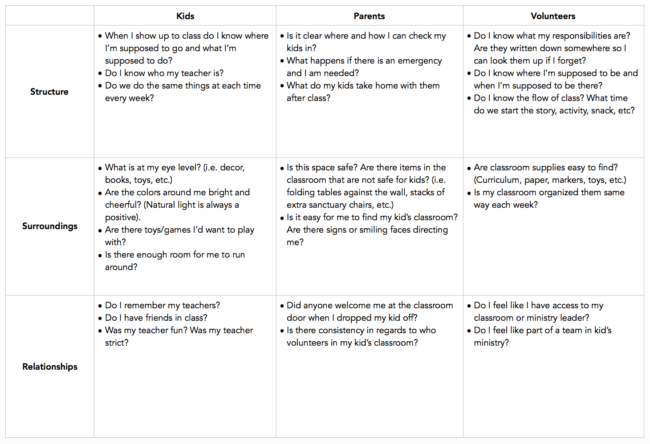In the past five years serving as the Kid’s Director (or some iteration of that role) at Living Stones Church Reno, the one thing that has stood out to me is that no church does kid’s ministry the same, and that is okay. One thing most kid’s ministries have in common is having one person who is the main leader, whether that be a full-time paid staff member or an unpaid volunteer. I’ve found there are a few principles that can apply across the board as well.
As a kid’s ministry director there are three groups of people we have to think about: kids, parents, and volunteers. And when making any new plans for my ministry I find it helpful to put myself in the shoes of each of these people and ask a few questions that pertain to three categories: structure, surroundings, and relationships. You can view the chart below to get an idea of what I’m talking about.

In my experience, of those three groups of people, your volunteers are often the most difficult group of people to plan for, so in this post, I’ll try to outline the questions and answers I ask related to how to set up good structures, surroundings, and relationships for volunteers.
Structure for Volunteers
If I’m a volunteer in your ministry can I explain to an outsider what my responsibilities are? If I don’t know what I’m responsible for is there a place I can look it up or a person I can ask?
It’s hard enough just to find a kid’s volunteer so we don’t want to wear them out or cause frustration by not giving them the instruction they need.
I once had a volunteer we’ll call “Jane.” Jane was a fantastic volunteer with the can-do attitude you wish every volunteer had. After about six weeks of serving in LS Kids I could tell Jane was frustrated but I had no idea why. After talking with Jane it turned out she had been going a little overkill when preparing for Sunday’s lessons and was never able to get through all the material she had prepared. At Jane’s previous church the presentation of the lesson was different and Jane’s role looked different. In LS Kids, Jane’s role was more along the lines of a classroom facilitator instead of a teacher. However, this had never been clearly communicated which led to her frustration.
After Jane’s role was clarified she was able to serve our in ministry without becoming frustrated or overexerting herself. Learning from this experience, we now have role descriptions detailed in our handbook for each level of volunteer. Volunteers are now able to reference the handbook if they ever have questions about what they should be doing.
Do I know where I’m supposed to be and when I’m supposed to be there?
One of the most helpful tools for us in LS Kids is having a designated time where volunteers from each service gather to share evidences of God’s grace, hear announcements for the week, and pray. We call this time Preservice Prayer and it helps all of our volunteers get on the same page before heading into serving. Regardless of how you structure it, it’s important that the time and place to “report for duty” is clear.
Do I understand the flow of class? What time do we start the story, activity, snack, etc?
Nothing creates chaos like a volunteer that doesn’t know what to do with 20 preschoolers. A simple fix for this could be posting a schedule in your classroom or clearly detailing it in the week’s curriculum.
Surroundings for Volunteers
Is my classroom organized in the same way each week or does it change from week to week? Are classroom supplies easy to find? (Curriculum, markers, paper, glue, toys, etc.)
It seems like common sense that volunteers can only use the tools they can find. However, in the rush of setting up for a Sunday it’s easy to place materials in one place when they really belong in another. To make life easier on my volunteers I try to make sure things find the same home each week.
Although, it’s important to note that an organized classroom is not just based on a good system but also good communication. At Living Stones we have multiple services on a Sunday and multiple volunteer teachers in the same classroom. This means communication with volunteers needs to be clear as to where things go and why things get put away. Communication between teachers at each service is also important.
Relationships for Volunteers
Do I feel like I can talk to my ministry leader?
As a volunteer, feeling like you have a certain amount of access to leadership is important. This means ministry leaders need to make themselves available to some extent, and this level of availability will depend on the size of your volunteer team. LS Kids has 90+ volunteers, so I am not available to resolve every issue or offer instant insight to every volunteer. However, I work hard to always make myself available to the 14 lead teachers. In turn, lead teachers make themselves available to the volunteers in their classrooms.
Do I feel like part of a team?
Feeling like part of the team is often the difference between having a successful classroom or an unsuccessful classroom. At LS Kids, we build our teams with a lead teacher who we know can involve others and share responsibility. When volunteers share responsibility they can take ownership in their classroom. In LS Kids we want volunteers to feel like it’s their classroom and not just a classroom.
If you found this information helpful I would encourage you to use the table shared above and ask some of the similarly categorized questions from the perspective of kids and parents in your ministry. And, if you are new to kid’s ministry or if have any questions about how things work in LS Kids, feel free to email me at MarkO@LSChurches.com.
Mark presented this material at Engage 2017, Acts 29 US West’s annual conference. You can read posts from other speakers at Engage on our blog.











